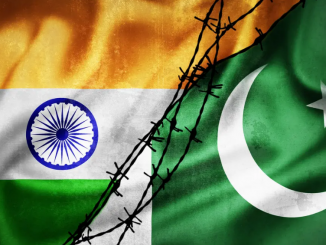
| Published April 27, 2025
In a significant escalation of tensions between India and Pakistan, Pakistani Railways Minister Hanif Abbasi issued a stark warning to India, asserting that Pakistan’s arsenal of 130 nuclear weapons is specifically aimed at its neighbor. He emphasized that these weapons are not merely for display and are strategically positioned across the country. Abbasi’s remarks were made in response to India’s recent actions, including the suspension of the Indus Waters Treaty and the expulsion of Pakistani military attaches, following the deadly Pahalgam terror attack that claimed 26 lives.
The minister warned that any attempt by India to halt Pakistan’s water supply would be considered an act of war, stating, “If they stop the water supply to us, then they should be ready for a war.” He further claimed that Pakistan’s missile systems, including Ghori, Shaheen, and Ghaznavi, are ready for deployment and are not just for show.
These statements have raised concerns internationally, as they represent one of the most direct nuclear threats issued by a Pakistani official in recent years. The situation underscores the fragile nature of India-Pakistan relations and the potential for rapid escalation in the region.
Here are the key implications of the Pakistani minister’s open threat and the rising tensions between India and Pakistan:
For India
-
Increased Security Concerns:
The direct nuclear threat underscores the high-risk environment in which India must navigate, potentially prompting India to further bolster its own defenses and readiness for any potential escalation. -
Pressure on Diplomatic Channels:
India may face greater pressure to respond carefully, balancing national security interests with the need to prevent the situation from spiraling into full-scale conflict. Diplomatic efforts to de-escalate will likely intensify. -
Heightened Domestic Nationalism:
Public sentiments in India may turn more nationalistic, possibly fueling calls for military retaliation, which could be politically leveraged by the ruling government.
For Pakistan
-
International Isolation Risk:
Pakistan’s open nuclear threat may lead to condemnation from the global community, including its allies, as nuclear brinkmanship is heavily discouraged in international relations. -
Escalation of Military Posture:
Pakistan may feel compelled to prepare its forces and nuclear arsenal for immediate deployment, increasing the chance of military skirmishes along the Line of Control (LoC). -
Internal Political Pressure:
Domestic pressure may mount on Pakistan’s leadership to back up these threats, potentially leading to further provocations and internal instability.
For the Region
-
Risk of War:
The nuclear threat makes any misstep or miscommunication far more dangerous, with the potential for rapid escalation into a conventional or nuclear conflict that could devastate the region. -
Disruption to Regional Stability:
The heightened tensions could derail ongoing peace-building efforts in South Asia, as both nations dig in their positions, affecting trade, tourism, and security cooperation in the region.
Global Implications
-
Increased International Intervention Risk:
International organizations, including the United Nations and the U.S., may increase their diplomatic and peacekeeping efforts to prevent escalation. However, the involvement of nuclear powers adds complexity to any mediation. -
Shift in Alliances:
Countries like China, the U.S., and Russia may need to reevaluate their relationships with both India and Pakistan, as any regional conflict could have broader geopolitical consequences.
Economic Impact
-
Economic Disruption in South Asia:
Prolonged tensions could disrupt trade and investment in the region, particularly affecting India and Pakistan’s economies, both of which are heavily reliant on trade within Asia and beyond.
Overall Takeaway
The open nuclear threat from Pakistan’s minister highlights the fragile and volatile nature of India–Pakistan relations, where tensions could rapidly escalate from rhetoric to real conflict. With both nations possessing nuclear arsenals, the risk of a catastrophic misstep is alarmingly high. This statement amplifies regional insecurity, pushing the international community to urge caution and dialogue. For India, it reinforces the urgency of security preparedness, while for Pakistan, it risks further isolation and global condemnation. Ultimately, the situation underscores how fragile peace is in South Asia and how easily the region could be pushed into a broader conflict, with profound consequences for both countries and the world.
SOURCES: INDIA TODAY – 130 nukes aimed at you: Pak minister’s open threat to India as tensions flare
THE HINDUSTAN TIMES – Pak minister threatens India amid tensions: ‘130 atomic weapons not for display’
THE TIMES OF INDIA – ‘130 missiles kept for India’: Pakistan minister’s open threat as tension escalates over Pahalgam attack
PRAGATIVADI – Pak Minister Issues War Threat Amid Rising India-Pakistan Tensions Over Indus Water Suspension





Be the first to comment